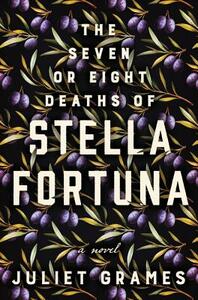You need to sign in or sign up before continuing.
Take a photo of a barcode or cover
emotional
inspiring
medium-paced
emotional
reflective
sad
medium-paced
Plot or Character Driven:
Character
Strong character development:
Yes
Loveable characters:
Complicated
Diverse cast of characters:
Complicated
Flaws of characters a main focus:
Yes
emotional
medium-paced
Plot or Character Driven:
Character
Strong character development:
Yes
Loveable characters:
Yes
Diverse cast of characters:
No
Flaws of characters a main focus:
No
Graphic: Child death, Rape, Pregnancy
Moderate: Alcoholism, Animal cruelty, Chronic illness, Alcohol
what a beautiful historical fiction based loosely off of the author’s family tree and history. I always love a good story that travels through time and place, such as us following Stella Fortuna from Ievoli, Italy to Hartford, Connecticut and the haunting deaths that followed her. Very much like real life, this story had heartbreakingly beautiful moments and too-true to life trauma. Following Stella’s life from her mother’s birth to her own death was a rollercoaster of emotion and I highly recommend this read. Because it is such a realistic fiction there is no happy ending but such is life. Despite this, this novel is truly beautiful and I would read again.
mysterious
slow-paced
I felt the book was too long, too wordy, and lacked focus. It was interesting at first but after about 40% or so, I was quickly losing interest.
4.5??? Beautiful, entertaining, heartbreaking... I can definitely see what people meant when they said that the family tree at the front of the book is helpful due to names being repeated in families throughout the generations, but once you get to know each character it becomes extremely easy to remember most people.
The ending of this made me so sad!! I love books about sister relationships,
"Stella was not truly suicidal because she never wanted to die. She had fought death too hard for that. But, as the distinction goes, she often wished she did not have to be alive" p. 325
The ending of this made me so sad!! I love books about sister relationships,
Spoiler
and it was sad to see that Stella and Cettina never make up... I wonder what the author's reason for doing this was."Stella was not truly suicidal because she never wanted to die. She had fought death too hard for that. But, as the distinction goes, she often wished she did not have to be alive" p. 325
dark
emotional
reflective
sad
tense
slow-paced
Plot or Character Driven:
A mix
Strong character development:
Yes
Loveable characters:
Complicated
Diverse cast of characters:
No
Flaws of characters a main focus:
Yes
Wonderful book to read. Subject matter is dark, but writing is very good.
This book is eminently readable from the start. What does Juliet Grames the author mean by seven or eight deaths? This story follows Stella Fortuna, "Lucky Star" in Italian, throughout her life, recounting her dramatic mishaps/near deaths.
I delighted in the Italian dialect that I recognized from my youth - little words and phrases here and there that resonated with my lived experience. As a matter of fact, those words cannot be found in Google translate, or even in Italian classes. So when I saw them in print, I actually learned how they were spelled and I felt validated about their use. My mother always said would you like a "sangwige." That's what it sounded like to my ears, and my americanized cousins made fun of the pronunciation -" it's sand-wich" they would say. In the book, Grames spells it "sanguicci." So my mother brought this word with her from Italy and with a Neopolitan accent, dropped the "i." The other words were capotost (stubborn, thick head), and cafoni (kind of like saying white trash). My Neoplitan mother put a hard "c" and made it more like "gavone." (Maybe if I had watched "The Sopranos" this wouldn't be as great a revelation!)
Anyway, back to the story...the mishaps became more and more gory, and Stella's life became more and more sad because she was restricted by her father and customs. I understood her need to be on her own, and given the era (WWII and beyond), knew that she would have to conform.
There are graphic descriptions of some really awful things that went on, but bravo to Grames for portraying them. Not every Italian family has the assorted characters in this book, but it does speak to inherited dispositions and behaviors in any family. Religion is front and center, but so are traditional magical incantations, a holdover from before Christianity.
This could be a difficult read for many, but SO interesting!
I delighted in the Italian dialect that I recognized from my youth - little words and phrases here and there that resonated with my lived experience. As a matter of fact, those words cannot be found in Google translate, or even in Italian classes. So when I saw them in print, I actually learned how they were spelled and I felt validated about their use. My mother always said would you like a "sangwige." That's what it sounded like to my ears, and my americanized cousins made fun of the pronunciation -" it's sand-wich" they would say. In the book, Grames spells it "sanguicci." So my mother brought this word with her from Italy and with a Neopolitan accent, dropped the "i." The other words were capotost (stubborn, thick head), and cafoni (kind of like saying white trash). My Neoplitan mother put a hard "c" and made it more like "gavone." (Maybe if I had watched "The Sopranos" this wouldn't be as great a revelation!)
Anyway, back to the story...the mishaps became more and more gory, and Stella's life became more and more sad because she was restricted by her father and customs. I understood her need to be on her own, and given the era (WWII and beyond), knew that she would have to conform.
There are graphic descriptions of some really awful things that went on, but bravo to Grames for portraying them. Not every Italian family has the assorted characters in this book, but it does speak to inherited dispositions and behaviors in any family. Religion is front and center, but so are traditional magical incantations, a holdover from before Christianity.
This could be a difficult read for many, but SO interesting!





